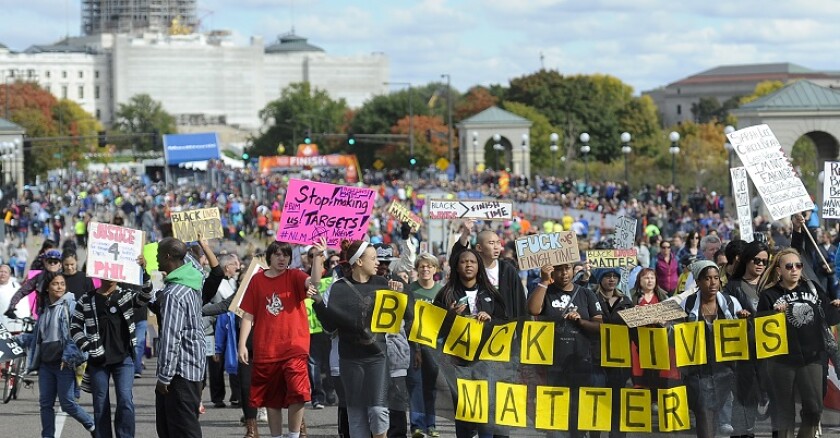Well-known activist DeRay Mckesson made a bid for mayor of Baltimore last month, and Black Lives Matter played a key role in other elections -- namely, helping to unseat prosecutors in Chicago and Cleveland who were seen as insufficiently rigorous in their pursuit of justice following police shootings.
But even as the movement works to hold elected officials accountable, some African-American politicians are working to highlight the need to change law enforcement and criminal justice policies. A group called the 20/20 Club, consisting of 20 Republican and 20 Democratic officials, will host forums on these topics at the two national party conventions this summer, while pressing Congress to act on legislation.
Street protesters helped signal “a new era of civil rights,” says Ashley Bell, Republican co-chair of the 20/20 Club. He says Black Lives Matter helped to mobilize people and branded a movement. But translating anger over police shootings and the economic ramifications of mass incarceration into new governmental policies still requires people who can work an inside game, people who take “a relentless, incremental approach,” says Bell, a former county commissioner in Georgia.
“We saw lots of marches, we saw lots of protests,” he says, “but where was that aspect that talked about policy and strategy? We think that part of the discussion needs to be brought to bear.”
Every protest movement with any real resonance has come to this crossroads. There’s always tension between those who want to topple the status quo and political insiders who say affecting real change requires working within a system protesters find tainted. “Street-based protest and militancy raises some issues,” says Rosemary Feurer, a historian of protest movements at Northern Illinois University. “Then there are groups that come forward that say, ‘We’ll address these issues, but we’ll be brokers. We’re going to direct this anger toward a more detailed purpose.’”
One certain difference between the approach taken by the 20/20 Club and the Black Lives Matter movement is that the elected officials’ group includes top police officials and organizations as part of its advocacy work. That might not sit well with activists, but if police are part of the problem, they need to be part of the solution, says Bell.
The 20/20 Club’s goal is to make policing and criminal justice a top-tier issue in the presidential campaign and to ensure meaningful legislation is enacted by the time of the presidential election in 2020. Already, members of the club have pushed issues such as decriminalization of marijuana in their states. “We’re trying to add policy to quiet the concerns that are being reflected in the Black Lives Matter movement,” says Democratic state Rep. Ted James of Louisiana, a club member.
When James says he’s trying to quiet the movement’s concerns, that doesn’t mean he’s trying to dismiss them. Quite the contrary. The eruptions of distrust and unrest within the black community have led African-American officials to try to find common ground on these pressing issues, on a bipartisan basis, wherever possible. Last fall, in South Carolina, the group hosted the only forum on criminal justice issues that drew presidential candidates from both parties.
High-profile events, whether they’re televised speeches or marches, can draw attention to an issue. The grunt work that leads to policy change looks a lot different from protests, but it doesn’t have to be done in opposition to the activists. “We play a different role,” Bell says. “We like to say that we’re a different instrument within the same orchestra.”









